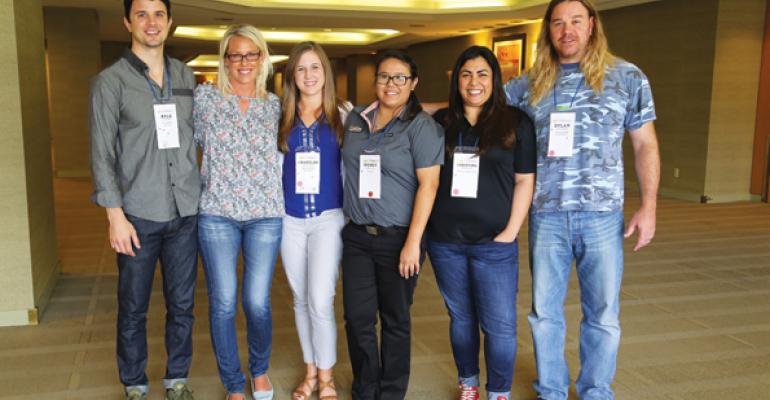Hourly restaurant workers turned the tables on restaurant human resources and marketing executives Thursday to share their front-line experiences during the annual Summer Brand Camp event in Dallas, presented by analytics firm TDn2K and social-strategy company BTC Revolutions.
The hourly employees said managers and corporate executives have a big impact on the front-line experience with simple actions.
The panel included: Wendy Alejo, a shift lead at Taco Bell; Kyle Istook, head bartender at On The Border; Dylan Johnson, bartender at Dallas’s Truck Yard, Dodie’s and Milo’s; Christina Peddy, assistant general manager at the Which Wich franchisee Smart Restaurant Group; and Chandler Purcell, branding assistant at Austin, Texas-based K&N Management, which franchises Rudy’s and owns Mighty Fine Burgers.
RELATED
• Elevate service from good to great
• Restaurants leverage tech in tightening labor market
• More restaurant human resources news

“Actions speak louder than words,” said Dylan Johnson, bartender at Dallas’s Truck Yard, noting that good managers and executives pitch in wherever necessary, with no task too menial. “If you haven’t done it in front of them, you can’t ask them to do it.”
And management can inspire hourly workers with simple acknowledgements. Impacting the line worker positively can be as simple as having “a manager slap you on the back and say, ‘Man I really appreciate what you are doing today. Thanks for staying that extra hour,’” Johnson added.
The motivations of the front-line workers for entering the industry were varied, but people and customers were a common theme.
“I worked in my first restaurant, a Schlotzsky’s, when I was 16,” Istook said. He later joined On The Border, enticed by the good incomes of his friends who were working there.
“Ultimately,” he added, “it was the money that brought me into it, and the people and the customers that made me stay.”
Alejo said it was the sense of camaraderie in the work place that drew her.
“Working in restaurants, it becomes your second family,” she said.
And for Purcell, who started working in a Sonic at 17, the motivation was rooted in amusement.
“I thought it would be fun to work on roller skates,” she said with a laugh.
Johnson, who started as a line cook and moved into bartending, said he has come to realize the hospitality industry has a core base.
“It dawned on me about 10 years ago that I’m not in the bar business,” he said, “I’m actually in the people business. You can get a Bud Light anywhere in this town. There’s a reason you come to my bar to get it. Without people, you have no business. Everybody knows that. I don’t think they think about it enough.”
Hourly employees are juggling many demands on their time, Peddy said, and the restaurant industry schedules are flexible for workers’ school and family. Istook said the flexibility of schedules adapted well his schooling and interest in a band.
Restaurant executives can make the hourly workers’ jobs more fulfilling in several ways, the panelists said.
Among their suggestions were increased compassion for workers’ needs, such as transportation or childcare, as well as hours worked. Istook suggested corporations empower managers “to be compassionate to employees for scheduling.”
“Compassion and having a sense of empathy is a key quality of a manager,” Block said, asking the hourly workers what other skills managers should possess.
Johnson suggested more sharing of corporate missions and goals with the hourly employees, as suggested in a Brand Camp presentation by Tony Bridwell, chief people officer at Chili’s Grill & Bar parent Brinker International Inc.
“I think there’s a large lack of communication in this business, and it trickles down,” Johnson said, and companies would benefit by making sure the needed information gets to the front-line workers.
Peddy echoed that effective communication was the key to front-line success. As an assistant general manager at Which Wich, she said, “I want to make sure that there is an understanding that if you give 110 percent, I give 110 percent. There’s nothing I’d ask of you that I wouldn’t do myself. When employees see their managers work just as hard as they do, they do the same. We lead by example.”
Purcell added: “I’ve worked for a couple of managers, one who was called the ‘People’s Champ,’ and I think it’s really important for your boss to be a people person.”
Block called the front-line workers “the heart of our organizations.”
“No matter how delicious our food is, it’s the experience these people are creating that’s bringing the customers back,” Block said.
This story has been revised to reflect the following correction:
Correction: June 6, 2014 An earlier version of this story misidentified two subjects in the first photo. They are, from left, Wendy Alejo and Christina Peddy.
Contact Ron Ruggless at [email protected].
Follow him on Twitter: @RonRuggless





